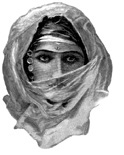
The Weaker Sex
GUEST COLUMN
It happened again: This time, it was a visiting priest who, after referring to the First Person of the Trinity as “He or She,” explained his statement with the appeal, “After all, what about the women?” His homily, however, gave no clarification of the question he posed. His meaning, he apparently thought, was understood by all: If women do not hear God described as female, they will go stark-raving mad and die in a state that is worse than one without grace — they will perish unfulfilled.
This view of women as incapable of functioning if their spiritual instruction is not peppered with a steady diet of shes and hers (or, at least, restricted with a steady fast from hes and hims) seems to be the nonnegotiable stance of much of religious and seminary education. The result is legions of well-meaning priests tripping over their tongues in an effort to show compassion to the emotionally challenged half of their flock. In our parish, after 9/11, we listened to a moving tribute to our heroic “firepeople.” Although here English is usually spoken as it naturally flows, with no backward talk of gentlemen and ladies, sugar and cream, whey and curds, or Robin and Batman, our priests ask us as “sisters and brothers” to pray. As often as not, we are treated to the new-and-improved Nicene Creed with a pregnant pause in place of the hostile word men: “For us [pause] and for our salvation….”
I sympathize with the position in which many priests find themselves. Twenty years ago, as the secretary of a God-centered self-help group, I took a look at the standard readings for the group and noticed how “offensive” they were to women. All the pronouns were masculine — yet it was a women’s group. I was not actually personally offended, for I knew that the word men and its related pronouns included all people. But having recently graduated from a major university, I was made to understand that women are marginalized and demeaned by such “masculine-biased” language.
Always having had a bit of a rescuer personality, I decided to save my sisters from the assaults of masculine pronouns, and re-typed all the readings for the group with replacement feminine pronouns. Mom, a fellow group member, was present at this historic typing session, and inquired into it. After having had her inquiry answered, Mom offered no comment. She did, however, offer a look that sent a shiver through my conscience. I received many more such looks at the unveiling of the enlightened readings. I discovered that God-centered women are fiercely protective of the integrity of their source documents. I still find that to be true twenty years later.
You May Also Enjoy
How are we to heal society and the church of negative “masculine” qualities, if not through the love of Christ which comes in the sacraments and prayer?
Men and women are different. Masculine and feminine are unique God-given qualities that cannot be genderblended into oblivion.
The significance of the biological distinctions between men and women, amplified by centuries of religiously and culturally encouraged differences, are not to be altogether scorned.

